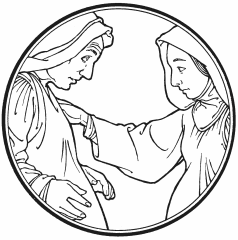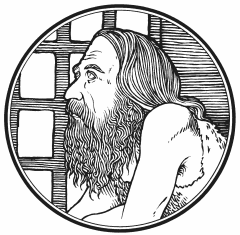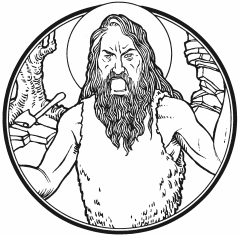Grace, mercy, and peace to you from God our Father, and from our Lord and Savior, Jesus Christ, amen. The text for the sermon is the Old Testament, which was read earlier.
What shakes up your world? What makes you uneasy and anxious? Is it an unstable stock market? Is it world events or natural disasters? What about a warning or report from your doctor? Each of us is no doubt shaken in different ways by different developments in our lives. For some, it’s the loss of a loved one at Christmas. It might be the possibility of losing ones job or mountains of debt that you never think you’ll get out from underneath. Whatever your anxieties, Jeremiah would understanding your condition. He was shaken by a number of things in his world.
First, God had called him to be a prophet and to speak God’s Word in a time when people refused and resented God’s messengers. (Not much has changed today with regards to that sentiment by the world). At least twice there were attempts on his life. The refusal and violent reactions to his messages caused him great anguish. Jeremiah shares his frustration as he prays to God: “O LORD, you have deceived me, and I was deceived; you are stronger than I, and you have prevailed. I have become a laughingstock all the day; everyone mocks me. For whenever I speak, I cry out, I shout, “Violence and destruction!” For the word of the LORD has become for me a reproach and derision all day long. If I say, “I will not mention him, or speak any more in his name,” there is in my heart as it were a burning fire shut up in my bones, and I am weary with holding it in, and I cannot.” Everything around Jeremiah was falling apart. The Babylonians were about to conquer Jerusalem and enslave its population. Jeremiah was at a crossroads: he was called to announce that this would all happen because the people had so completely rejected the God who had given them the land, the temple, Zion, and Jerusalem.
Regardless of all that was going on in Jeremiah’s life, no matter the fear of what tomorrow would bring, Jeremiah has words for God’s people: “Behold, the days are coming, declares the LORD, when I will fulfill the promise I made to the house of Israel and the house of Judah. In those days and at that time I will cause a righteous Branch to spring up for David, and he shall execute justice and righteousness in the land. In those days Judah will be saved, and Jerusalem will dwell securely. And this is the name by which it will be called: ‘The LORD is our righteousness.’”
Here is a calming and healing word for God’s people. Here is a restoring and refreshing word for a people a people who had rejected God. This is a reiteration of the promise made to Adam and Eve. This is the promise of a Savior. This is the promise of Jesus. Jeremiah describes the coming of one who would reverse the curse of the people’s rejection of their faith and their idolatrous ways. The Jerusalem that would experience violence, bloodshed, anguish, and enslavement would once again dwell in security and enjoy wonderful prosperity. God’s blessings would be lavished upon her once again.
This great reversal would be brought about by the presence of the one who would bring justice and righteousness. David’s seed, Jesus of Nazareth, fulfills this wonderful word precisely as Jeremiah promised.
And so we see in our Gospel reading the same account as we do for Palm Sunday – the triumphant entry of Jesus into Jerusalem. And what do the people shout: “Blessed is the King who comes in the name of the Lord! Peace in heaven and glory in the highest!” That is what we proclaim today, preparing for the arrival of the infant Jesus in the manger. Listen to what Luther writes when speaking of Christ’s triumphant entry: “This is what is meant by ‘Thy king cometh.’ You do not seek him, but he seeks you. You do not find him, he finds you. For preachers come from him, not from you; their sermons come from him, not from you; your faith comes from him, not from you; and where he does not come, you remain outside; and where there is no Gospel there is no God, but only sin and damnation, free will may do, suffer, work, and live as it may and can. Therefore you should not ask, where to begin to be godly; there is no beginning, except where the king enters and is proclaimed.”
You see, everything centers on the coming of Christ into our sinful and fallen world. You want to be sinless? You can’t. You want to be righteous? You can’t. You want to save yourself? You can’t. You want to be godly, as Luther says? You can’t. But with the coming of Christ, you are made sinless. With the coming of Christ you are declared righteous. With the coming of Christ, you have been saved. Everything centers on Christ and what He does.
Here in this House, the Branch of Righteousness also springs forth today. He comes to speak salvation from Satan and death. He comes to give out His righteousness through His mighty Word. All mankind needs this coming of the Branch. All men are sinful, and therefore need this Savior to come into their midst to give out His forgiveness. But many have given up hope. Many have stopped believing in the coming of Messiah among men through Word and Sacrament. Many think that Christ is far distant in heaven, and does not come among men. We forget that He is here, the King of the universe, the Son of David, in our midst. Our spirits are slow and cold too often, as if He does not come.
But He comes here indeed, since He has prophesied and promised it. He has said He would be here, and He does not break His promises, made some two thousand years ago. Here He is in His Body and Blood. Here He is speaking, since He who hears His servants is hearing Him. Here He is in the midst of us, where two or three gather together. He shall come in this way to be with us always, until the very end of the age. Although our sinful souls are not worthy of His coming, He comes anyway, to give us grace.
Jeremiah spoke that message to his contemporaries. He faithfully spoke God’s Holy Word. The majority rejected his message, but a significant minority listened and believed. They saw reality for what it was. They saw the beauty and wonder of the God who made a promise and reinforced that promise. They confessed their sins and rejoice in God’s forgiveness for the sake of David’s Seed, Jesus.
So today we rejoice with Jeremiah. Beyond the disappointment and challenges of this world, the Seed of David brings a peace that the world cannot replicate, for this peace is the peace that knows on account of Christ, our sins have been forgiven and we have life everlasting in the promised Messiah. In Jesus’ name, amen. Now the peace of God that passes all understanding keep your hearts and minds through faith in Christ Jesus, amen.



